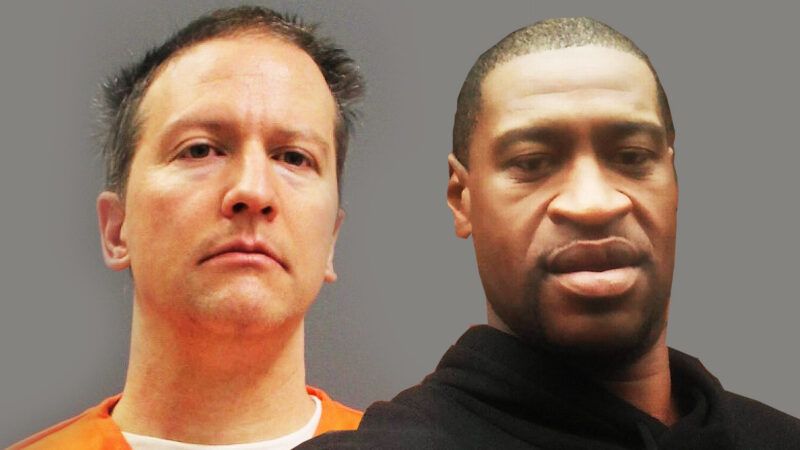The Chauvin Verdict Is a Reminder That We Still Need To Abolish Qualified Immunity
Most victims of police misconduct never get to take their cases to court.

A jury this week convicted former Minneapolis Police Department (MPD) Officer Derek Chauvin on all counts for the murder of George Floyd, but one case can't fix a series of broken systems. While Minneapolis has compensated the Floyd family and Chauvin has been convicted, few cases of police misconduct conclude in favor of their victims.
To help more people abused by police get justice, the U.S. must reform qualified immunity, the legal doctrine that makes it perniciously difficult to hold police officers accountable in civil court when they violate your constitutional rights.
It's remarkably rare for a police officer to face criminal charges for the misuse of force. We know that Chauvin had 22 complaints filed against him by the time he was arrested for Floyd's death, and that he was allowed to remain with the MPD through all of them.
When it comes to fatal encounters, we have a slightly better idea of the disparity: Only about 139 officers since 2005 have been charged with murder or manslaughter in relation to an on-duty shooting, though about 1,000 fatal police shootings occur each year. Of the officers charged, a small minority are convicted.
Counting fatal encounters omits many more victims of police misconduct who live to tell about it. The data we do have paints an incomplete but unsettling picture, as police departments often refuse to make public reports against officers. A report from ProPublica is instructive: "In 2018, the [Civilian Complaint Review Board] looked into about 3,000 allegations of misuse of force [in the New York Police Department]," wrote Eric Urmansky last summer. "It was able to substantiate 73 of those allegations. The biggest punishment? Nine officers who lost vacation days."
In other words, people whose rights are violated by police can't always count on the criminal courts or even police departments to reprimand their employees; civil suits are often the only avenue to justice. Yet thanks to qualified immunity, those individuals often find that road blocked off, too.
The legal doctrine, manufactured by the Supreme Court, protects government officials from federal civil rights lawsuits if the official's specific behavior was not "clearly established" as a rights violation in a precedent handed down by the U.S. Supreme Court or by another court within the same circuit. In other words, for a plaintiff to sue a police officer in federal court, a prior plaintiff must've already sued over the exact same violation and won. Any plaintiff who sues after being harmed in a remotely unique way risks being told that the officer who harmed them could not have been expected to know they were violating the Constitution.
In granting qualified immunity, federal judges must agree that someone's rights were indeed violated, while in the same breath making it legally impossible for them to sue the violator. Convincing a judge to deny qualified immunity simply allows the plaintiff to press forward with their lawsuit.
Consider a decision delivered by the U.S. Court of Appeals for the 9th Circuit, which granted qualified immunity to two cops in Fresno, California, after the men allegedly stole $225,000 while executing a search warrant. In theory, the officers should know stealing is wrong, the court noted, but without a court precedent on the books expressly saying so, they couldn't be expected to know. The men were never charged in criminal court, and the victim was legally barred from suing.
Consider a more recent case. Two plainclothes officers in Cleveland, Ohio, assaulted and arrested a man who happened to be standing outside his own house. They then turned around and charged him with assault, booking him in jail for several days, although those charges were eventually dropped. The cops never faced any criminal repercussions themselves—for the bogus charges or the beating—and the victim, Shase Howse, had no way of suing. The Supreme Court last month declined to hear his case.
There are many such stories—those who survive malicious or negligent encounters with state actors with almost no hope of criminal accountability and a remote hope for justice in the civil sphere. There was the 10-year-old who needed orthopedic surgery after Coffee County, Georgia, Deputy Sheriff Matthew Vickers shot him while aiming at the boy's non-threatening dog, leaving the family to bear those medical costs themselves. (The Supreme Court also refused to hear that case.) There was the man who sustained a lasting eye injury after an officer allegedly kneed him 20 to 30 times after he'd been subdued. There was the 15-year-old boy shot on his way to school, the surrendered suspect who cops sicced their police canine on, the man whose car was ruined during a bogus drug search.
Chauvin might seem like an example unbefitting of this discussion—the City of Minneapolis settled with Floyd's family for a reported $27 million. Had the case not been filmed and highly publicized, as in the above examples, that might not have happened.
"Incredibly, had the city not chosen to settle the lawsuit, Derek Chauvin would have had a very plausible chance of getting the suit thrown out on qualified immunity grounds—even after being convicted of murder," says Clark Neily, vice president for criminal justice at the Cato Institute. "There is no preexisting case in the Eighth Circuit under which it was 'clearly established' that pinning a suspect under one's knee for nearly ten minutes until they lose consciousness and their heart stops beating violates the Fourth Amendment."
The video footage here was the game-changer—something that victims aren't always afforded. It's also something that government officials may take issue with. In 2014, officers in Denver, Colorado, attempted to force a bystander to delete a film he took of them beating a suspect during an arrest. Though a federal court ruled those cops violated the First Amendment in doing so, it gave them qualified immunity.


Show Comments (47)